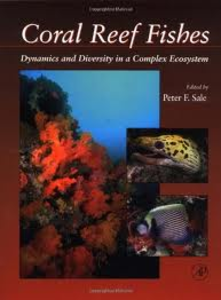Rarity in coral reef fish communities
Jones, Geoffrey P., Caley, M. Julian, and Munday, Philip L. (2002) Rarity in coral reef fish communities. In: Sale, Peter F., (ed.) Coral Reef Fishes: dynamics and diversity in a complex ecosystem. Elsevier, San Diego, CA, USA, pp. 81-101.
|
PDF (Published Version)
- Published Version
Restricted to Repository staff only |
||
![[img]](https://researchonline.jcu.edu.au/4392/2.hassmallThumbnailVersion/14366-14369%2C_743%2C_4392_coral_reef_fishes.jpg)
|
Image (JPEG) (Front Cover)
- Cover Image
Download (8kB) |
Abstract
[Extract] One of the greatest challenges in ecology is to explain the inequality of abundance of taxonomic groups, and, in fact, why a majority of the species in any ecosystem are relatively rare (Preston, 1948; Gaston and Lawton, 1990a; Gaston, 1994a; Kunin and Gaston, 1997). Unfortunately, rare species are rarely studied, so relatively little information is available on the processes constraining their distributions or limiting their numbers (Kunin and Gaston, 1993). Although the ecological processes influencing rare species may not be fundamentally different from those affecting common species, this cannot be assumed. Direct comparisons of the ecology and life histories of common and rare species, in a range of different taxa, are only now beginning to reveal the essential causes of rarity (Gaston, 1994a), but almost all the progress in this field has come from studies of terrestrial organisms. Gaston's (1994a) book entitled "Rarity," one of the first attempts to review this subject comprehensively, contained almost no marine examples.
Many factors may explain why the issue of rarity has been avoided by marine ecologists. The taxonomic status of rare species in many marine taxa is uncertain (Ray and Grassle, 1991). It is always difficult to sample rare species and this may be particularly true in aquatic environments. Published accounts of the geographic distributions of rare marine species are not always reliable because rare species may not be detected by the sampling method. Estimates of the abundances of rare species are almost always unreliable, because typical sample unit sizes and replication are invariably appropriate only for common species (Andrew and Mapstone, 1987). However, there is no fundamental reason why studies on rare marine species cannot make a major contribution to our general understanding of the phenomenon of rarity. Indeed, we cannot assume that the processes leading to rarity in terrestrial organisms apply to their marine counterparts. The prevalence of species with dispersive larval stages and consequently an "open" population structure may require new explanations of rarity. Therefore, comprehensive studies of marine taxa are necessary before a general synthesis of this fundamental ecological issue can be attained.
| Item ID: | 4392 |
|---|---|
| Item Type: | Book Chapter (Research - B1) |
| ISBN: | 978-0-12-615185-5 |
| Related URLs: | |
| Date Deposited: | 01 Jul 2009 01:23 |
| SEO Codes: | 97 EXPANDING KNOWLEDGE > 970106 Expanding Knowledge in the Biological Sciences @ 100% |
| Downloads: |
Total: 268 Last 12 Months: 6 |
| More Statistics |



